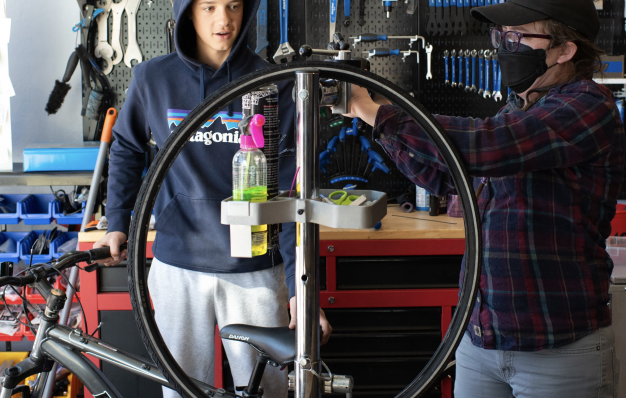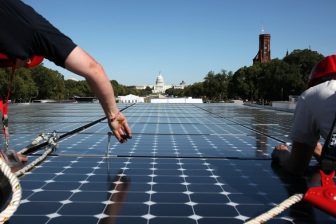
A Denver micro-school hatches within a bike shop and cafe
Customers grabbing a cup of chai at Pinwheel Coffee in Denver, Colorado, might notice something unusual: 12-year-old baristas taking orders and steaming milk.
The children behind the counter are students at Embark, an unusual micro-school that weaves experiential learning into academic work. The coffee shop and its adjacent bike shop, Framework Cycles, are embedded in the school and in its curriculum, offering context for students’ studies of math, history, and social studies.
The independent school, which opened in 2019, is intentionally tiny. It serves 28 students in grades 6 to 8 from greater Denver. The school is tuition free, funded by a Denver not-for-profit called Great Work Inc. Forty percent of seats are occupied by students of color, according to Embark Director Megan Parry.
During the school day, students can choose to take half-hour shifts in the cafe and bike shop, which are open to the public. Academic work often revolves around these businesses.
For instance, in a recent lesson on socially conscious purchasing, students researched businesses owned by people in marginalized groups, Parry said. They chose new suppliers for the bike shop, including a trans-owned screen-printing company and a woman-owned helmet business.
When one of the coffee roasters supplying Pinwheel went out of business, the school entrusted students to select a replacement, Parry said. Students identified values, researched and interviewed companies, created a decision-making matrix, and made persuasive arguments to each other on which supplier to choose.
“There was deep inquiry, there was communication, there was quantitative reasoning,” Parry said, citing some of the competencies students are graded on as they progress through school.
Embark is based on a value of “radical trust,” Parry said. Students don’t have a set schedule. Instead, every Monday morning, they build their own schedules, fitting in mandatory lessons, optional lessons, assigned coursework, and shifts in the café and bike shop.
On a recent morning, three students doing math practice looked at assignments of varying difficulty taped on the walls of a classroom. After choosing a place to start, they worked through the problems at their own pace, sometimes alone, sometimes consulting each other or a teacher.
In math class, students designed probability guessing games that they planned to offer to coffee shop customers in exchange for discounted drinks.
In the bike shop, two seventh-graders worked together to fix a wheel with a broken spoke. Students recently created an educational YouTube series called “Science of Cycling,” which offers tips on how to repair punctures and avoid getting flats, Parry said.
The mission of the school, she said, is to “courageously engage, inquire, and discover a sense of self.”
Melissa Bailey, Chalkbeat Colorado
This story was originally published by Chalkbeat, a non-profit news site covering educational change in public schools.Sign up for their newsletters at ckbe.at/newsletters
Correction: This story has been updated to reflect that while Embark is committed to diversity, it does not set aside seats for any one student group.
Photo credits, all by Melissa Bailey (top to bottom):




